Fatty liver disease is common these days. Most don’t know that severe FLD is life threatening. Can you get disability for fatty liver disease? If it is severe enough to stop you from working, then yes, you can. Find out how.
Contents
Fatty liver disease happens when there is build up of excess fat in your liver. Experts estimate that approximately 24 percent of US adults have nonalcoholic fatty liver disease. Some people suffering from nonalcoholic fatty liver disease have scarring, leading to Cirrhosis, which is life-threatening.
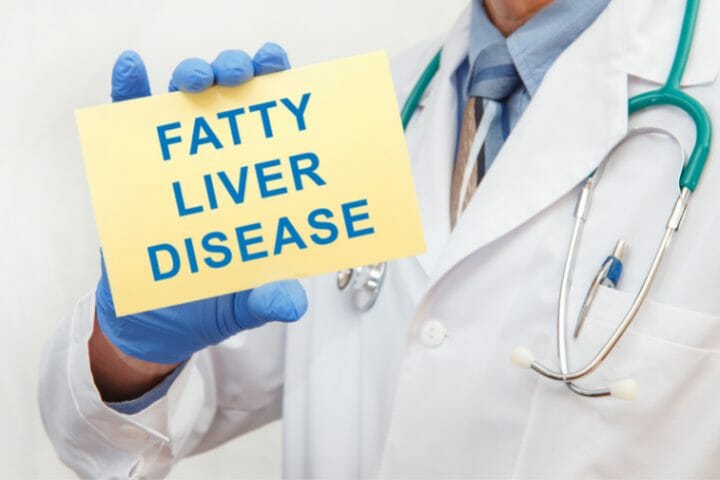
So can you get a disability for fatty liver disease? Simply having a diagnosis for this disease will not help you in obtaining disability benefits. Your condition needs to be severe enough that you cannot maintain your gainful work for more than 12 months.
Let’s discuss more about Fatty Liver Disease, its types, symptoms, diagnosis, and how you can get disability for it.
What Is Fatty Liver Disease?
The liver is an essential organ in our body. It helps in the production of bile which helps in the digestion process. Moreover, it helps convert nutrients into energy and helps flush out the toxins from the blood.
A small amount of fat is usually present in the liver. But when the fat starts depositing too much in the liver (5to 7 percent more than the normal weight of the liver) then you suffer from fatty liver disease. Most people who suffer from fatty liver disease don’t have any severe problems. But some people may have severe consequences with time.
The fatty liver disease progresses mainly through three stages. I am listing them below.
Stage 1: The first stage is known as Steatohepatitis. In this stage, the liver becomes swollen and damaged tissue.
Stage 2: The second stage is known as Fibrosis. In this stage, scar tissue starts to form causing liver damage.
Stage 3: The third stage is known as Cirrhosis. In this stage, excess scar tissue starts to take the place of healthy tissues in the liver. Consequently, the liver’s normal function slows down and may permanently stop the function of the liver. Cirrhosis can even cause liver cancer.
Types Of Fatty Liver Disease
There are two types of fatty liver disease. I am listing them below.
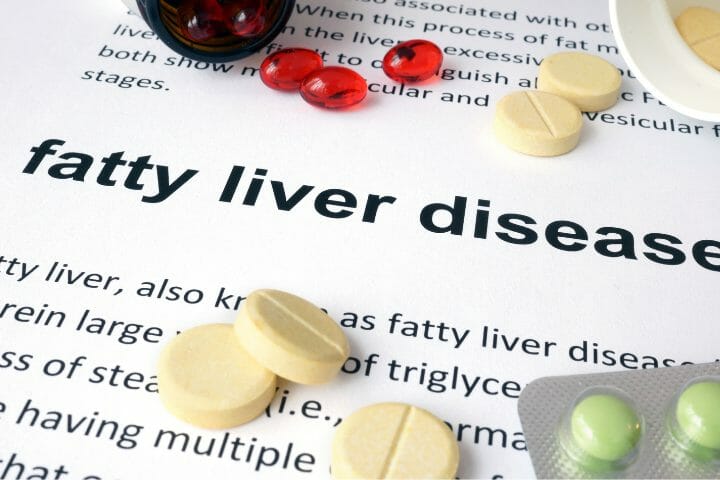
#1. Alcoholic Fatty Liver Disease
This disease is caused by drinking too much alcohol. Almost 5 percent of people in the United States suffer from alcoholic FLD. You can reduce the symptoms of alcoholic fatty liver disease by stopping drinking alcohol. If you are diagnosed with alcoholic fatty liver disease and keep on drinking alcohol, then the disease can cause severe problems like
- The liver starts to get enlarged, which causes discomfort and pain on the right side of your belly.
- The liver begins to swell, which can cause jaundice, belly pain, and fever
- A lot of fluid starts to build up in your belly
- Liver failure
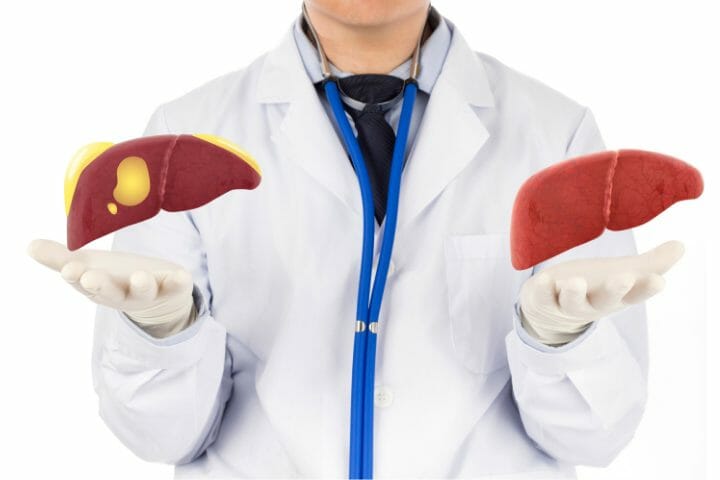
#2. Non Alcoholic Fatty Liver Disease (NAFLD) / Nonalcoholic Steatohepatitis (NASH)
Nonalcoholic fatty liver disease can occur in people who do not even drink alcohol. Unfortunately, one in 3 people in the United States suffers from nonalcoholic liver disease. The exact cause of this disease is still not known. However, obesity and diabetes can increase the risk of this disease. When Non Alcoholic Fatty Liver Disease (NAFLD) reaches an advanced stage, it is called Non-alcoholic steatohepatitis (NASH)
You might also like to read: Can You Get Disability For Congestive Heart Failure?
Symptoms
The symptoms of fatty liver disease are as follows
- Nausea
- Loss of appetite
- Legs start to swell, commonly known as edema
- Extremely tired
- Swollen abdomen
- Yellow skin and eyes
- Red palms
- Blood vessels begin to swell
- Breasts become enlarged
How Do Doctors Diagnose Fatty Liver Disease?
Most people do not have any signs and symptoms of fatty liver disease. So it’s hard to diagnose it. However, doctors use different methods to diagnose it. I am listing some of them below.
Health History: The doctor will ask you about drinking alcohol. It helps your doctor to diagnose whether you have chances of Alcoholic liver disease(ALD) or Nonalcoholic liver disease(NALD). Simultaneously doctor asks about your health history, lifestyle, diet, and others.
Physical Exam: The doctor checks your weight and body mass index to know the signs of fatty liver disease.
Blood Tests: The doctor does your blood test. There is a liver problem if there are high levels of liver enzymes in the blood, like Alanine Aminotransferase.
Imaging tests: The doctor recommends imaging tests like ultrasound, Sonography to confirm whether there is fat build-up in your liver. However, the tests cannot say about NALD or ALD.
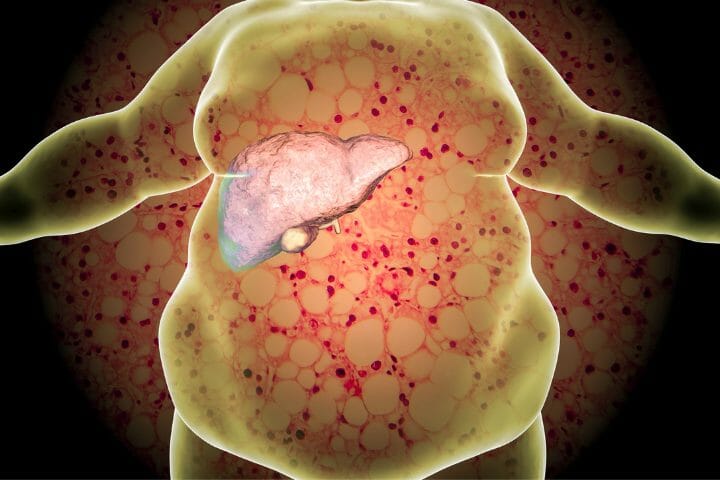
Liver Biopsy: Everyone diagnosed with fatty liver disease is not recommended for a liver biopsy test. The doctor may advise you for a liver biopsy If the tests described above show you have Cirrhosis in the liver. The doctor will give medications and numb the area to control the pain. Then he will take a sample of tissue and send it to the lab to check whether there is damage to the tissue or not.
Who Is At Risk Of Fatty Liver Disease?
- You have diabetes, high blood pressure, and obesity
- Women whose periods have already stopped
- Have a high level of belly fat
- You are a hypothyroidism patient.
- You are exposed to harmful chemicals every day
- You are above 60 years old.
- You are malnourished
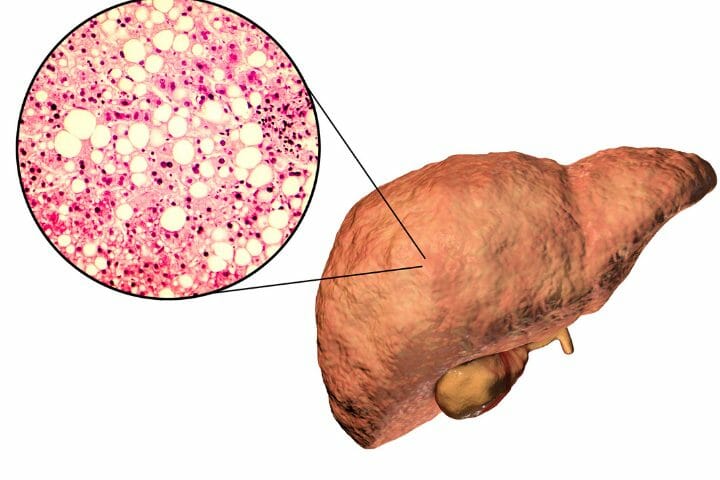
What Treatments Are Available For Fatty Liver?
There are no medicines particularly for Nonalcoholic liver disease till now. However, doctors first advise losing weight through physical activity. Losing weight can reduce fat in your liver and even reduce inflammation and scarring. Weight loss surgery is also another effective way to reduce nonalcoholic fatty liver disease signs.
Another important thing is to quit alcohol. Drinking alcohol can make liver problems worse. So you should speak to your doctor about how to stop drinking. If you have severe liver problems like Cirrhosis, the doctor may recommend liver transplantation.
You might also like to read: Can You Get Disability For Alcoholism?
Lifestyle Changes That Help With Fatty Liver Disease
#1. Try To Do More Exercise
You should try to do exercise at least for 30 minutes to lose weight. Losing weight may help you reduce fat in your liver and thus reduce the risk of fatty liver disease.
#2. Take Medications After Asking From Your Doctor
Always take medications or over-the-counter drugs after asking your doctor. Again if you are taking any herbal medicines or juice, then kindly consult your doctor and then take.
They are herbal, but that does not mean they are suitable for the health of your liver.
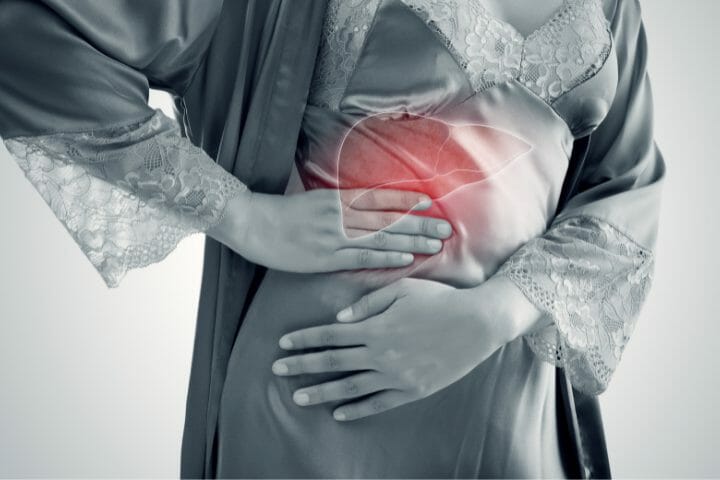
#3. Check our Blood Sugar Level
If you are a diabetes patient, then try to keep your blood sugar level in control. You can control your sugar level by taking medications on time, exercising, eating healthy food, and sleeping for 8-9 hours a day.
#4. Reduce Your Cholesterol Level
You can reduce your cholesterol level by doing proper exercise and eating healthy food.
How Disabling Is Fatty Liver?
Liver disease is also known as hepatic disease. Nearly 4 million people in the United States suffer from liver disease. However, the signs, symptoms, and types of liver disease vary from one person to another.
If you are suffering from chronic liver disease and the condition is severe enough to prevent you from working in your organization for almost 12 months. Social Security Administration will give you disability benefits. The disability benefits will help you meet daily expenses and spend money on your treatment.
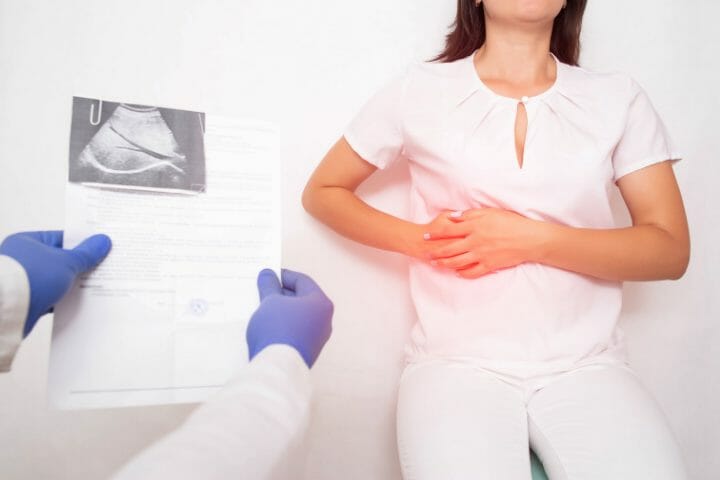
What Symptoms Will Qualify For Benefits?
- Infection in the fluid of the abdomen
- Fluids accumulate on your abdomen or lungs, and they are present on at least two evaluations within a gap of 60 days.
- Failure of vital organs like kidneys or lungs due to liver disease
- Suppose you have liver disease in the final stage, or your doctor has recommended a liver transplant. In that case, you are most likely to get disability benefits from Social Security Administration.
- Swelling in your legs and feet is one of the significant side effects of liver disease. Suppose you are doing a job involving a lot of standing, and your feet swell severely because of liver disease that hinders you from completing your work. In that case, you will more likely receive disability benefits from Social Security Administration.
- If you have liver disease, then the doctor will first prescribe you some medications. But medications have some side effects like confusion or getting tired. If the side effects of medications hinder your ability to do work in your organization, you will get disability benefits from SSA.
- If you have only weight because of liver disease, then that will not qualify you for disability benefits. However, suppose you have weight loss(BMI goes below 17.50) and two conditions like nausea, vomiting, or loss of appetite. In that case, you may qualify to get disability benefits from SSA.
- Suppose you have chronic liver disease and bleeding from vital parts of your body like the esophagus and stomach, or there is a severe change in the stomach lining that may require hospitalization. In that case, you have the chance of getting SSA benefits.
You might also like to read: Can You Get Disability For Stomach Problems?
Can You Get Disability For Fatty Liver Disease?
Whenever you apply for the disability benefits, the disability examiners of the Social Security Administration will evaluate your symptoms experienced due to fatty liver disease and how it affects your ability to work in an organization for almost five days a week.
The Social Security Administration undergoes five steps to determine whether you will get disability benefits for fatty liver disease.

#1. Do You Work?
The Social Security Administration first finds your SGA(Substantial gainful activity). SGA is defined as earning above $1310 in a month and $2190 for blind people in 2021.
If the SSA finds out that you are working and earning at the SGA level or more, you are not eligible to get disability benefits. But if you are working and getting more than the SGA limit and simultaneously getting Social Security disability benefits, then SSA will cease your benefits.
If you are earning less than the SGA limit, then you will proceed to the second step, where SSA will evaluate your symptoms regarding the fatty liver disease.
#2. Is Your Medical Condition Severe?
The Social Security Administration(SSA) will consider your condition to be disabled if you have severe fatty liver disease that hinders you in one of the following in your work organization which is expected to continue for at least 12 months or may end in death.
- sitting,
- standing
- remembering
- understanding
- making simple work decision
- interacting or responding o co-employees, supervisors,
If you have fatty liver disease and your condition is not that severe, you will not get disability benefits.
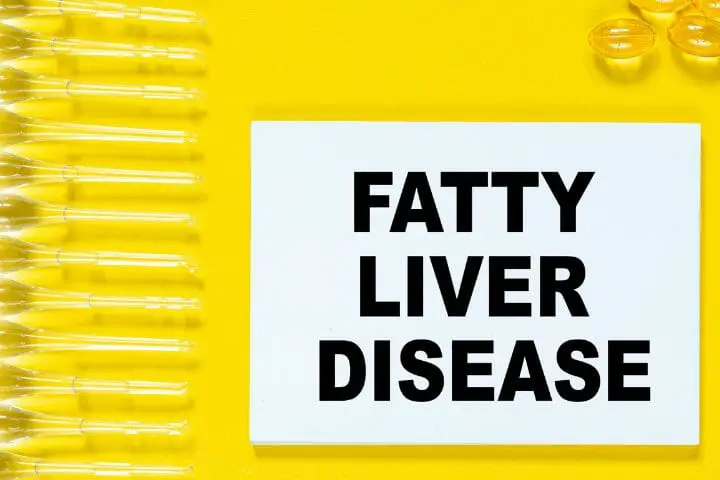
#3. Is The Severity Of The Condition Equivalent To That Required By The Listing?
The SSA lists a set of medical criteria to get disability benefits. There is a section 5.00 Digestive system in the Bluebook of Social Security Administration. In that section, you will find a subsection 5.05 chronic liver disease.
You need to meet the medical criteria to get benefits from SSA. But if your impairment doesn’t match the listing, then the SSA evaluates your Residual Function Capacity form. Your doctor fills out the form.
He writes in that form about your symptoms of fatty liver disease, medications you are taking, and how the symptoms affect your work life for almost 8 hours a day. After evaluating the RFC from the disability examiners will proceed to the fourth step.
#4. Can You Do Any Of The Jobs That You Have Performed In The Past Fifteen Years?
The SSA evaluates your PRW (Past relevant work). The PRW work is the work which you have done for the last 15 years, and that was a substantial gainful activity.
If the SSA thinks you can do your PRW work even after having fatty liver disease, you will not be qualified for disability benefits. But if the SSA determines that you don’t have a chance to do your PRW work, you will proceed to step 5.
However, you need to provide enough medical evidence to prove that you cannot continue your PRW work because of fatty liver disease. Simultaneously you need to provide an opinion from your doctor. Remember, the doctor who will give your opinion should be a specialist in treating liver-related diseases.
The doctors who specialize in treating Nonalcoholic Fatty Liver Disease include the following
- Haepatologists – Specializes only in liver
- Hematologists – Specializes in blood
- Gastroenterologists – Specializes in digestive organs and liver
The medical proof that you need to submit your claim includes the following
- Endoscopy
- Pathology
- Lab reports
- Imaging results like Sonography or ultrasound report
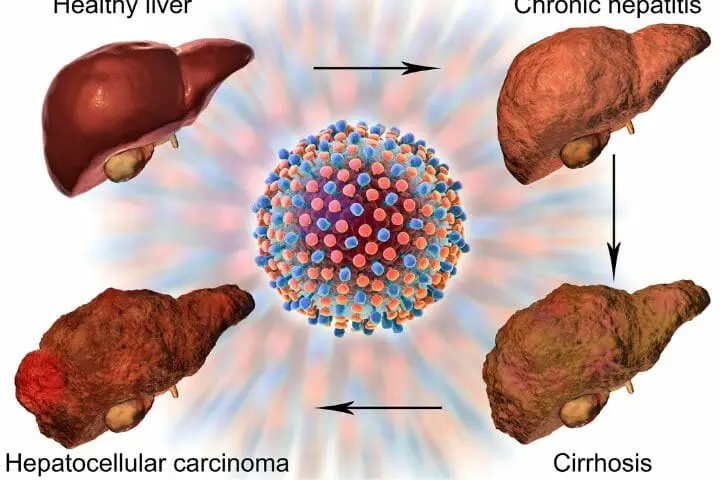
#5. Can You Do Any Other Type Of Work?
If you can no longer do your PRW work, then SSA evaluates your age, qualification, and work experience and find out whether you can do any other type of work. If SSA determines that you cannot do any other work, then you will be considered disabled.
You might also like to read: Can You Get Disability If You’ve Never Worked?
Can You Get Disability For Non Alcoholic Fatty Liver Disease?
Nonalcoholic fatty liver disease means building up extra fat in your liver. However, it does not occur because of taking alcohol. The reasons can be diabetes, high blood pressure, obesity, and others.
Yes, you can get disability because of nonalcoholic fatty liver disease. However, you need to provide enough medical records to prove that your condition is severe enough to hinder you from doing your work for at least 12 months.
The application of SSA is quite complicated. Around two-thirds of the initial claims are refused by SSA because of incomplete application. Try to complete your application thoroughly. If the application process is very confusing and complicated, then you can take the help of a disability attorney of SSA.

Frequently Asked Questions
#1. Does fatty liver disease shorten the life span?
A person diagnosed with nonalcoholic fatty liver disease can live for many years. However, 30 percent of them have inflamed liver and may have scarring. Again, 20 percent of them will have Cirrhosis, resulting in liver cancer or complete liver failure.
#2. Is fatty liver disease considered chronic?
Nonalcoholic fatty liver disease is quite prevalent throughout the world, especially in Western Countries.
It is considered a chronic disease in the United States as it affects almost one-fourth of its population.
#3. What is the difference between fatty liver and fatty liver disease?
Fatty liver means there is an accumulation of fat in your liver, but it will not cause any damage to the liver or hinder its functions.
But fatty liver disease can cause inflammation and scarring of the liver, which can permanently stop the functions of the liver, or you may have liver cancer.
A Few Final Words
Fatty liver disease, mainly nonalcoholic fatty liver disease, is chronic. It is a silent disease with no signs and symptoms. But simply diagnosing will not help you in getting disability benefits.
You have to provide enough medical records and prove that your condition is severe and that you cannot continue to work life for an extended period. We thank you for reading the article and hope we have covered everything in this article.
